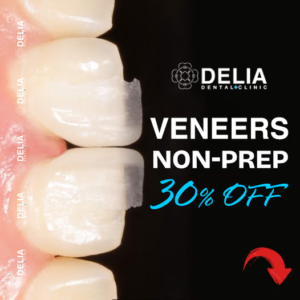Non-prep veneers are one of the most advanced cosmetic dentistry techniques, becoming increasingly popular due to their ability to provide a natural-looking smile without the need to grind down the teeth. This option is perfect for those who want a brighter, more beautiful smile without deep intervention into the natural tooth structure. In this article, we will explore what non-prep veneers are, their benefits, suitable candidates, and compare them to other options such as Emax veneers and traditional crowns.
Non-prep veneers are ultra-thin layers of high-quality porcelain, typically ranging from 0.2mm to 0.3mm in thickness, that are directly bonded to the surface of the teeth without the need for tooth reduction. This sets them apart from traditional veneers, which require the removal of a small amount of natural tooth structure to make room for the veneer.

Non-prep veneers preserve as much of the natural tooth as possible, making them an ideal choice for patients looking to enhance their smile without undergoing invasive procedures. This method is especially effective for individuals who only need cosmetic improvements, such as enhancing the color or shape of their teeth.
Preservation of Natural Teeth
High Aesthetic Outcome
Quick and Comfortable Procedure
Less Invasive and Time-Saving
Durability
Non-prep veneers are suitable for individuals with relatively healthy teeth who are looking to enhance their smile by addressing minor cosmetic issues. The ideal candidates include:
People with minor gaps between teeth: Non-prep veneers can effectively close small gaps and improve the alignment of your smile without the need for tooth reduction.
People with mild tooth wear: Those with slightly worn teeth due to aging or eating habits can benefit from non-prep veneers, as they restore both the shape and color of the teeth.
People with discolored or stained teeth: If your teeth are discolored or stained from factors like smoking, coffee, or medication, non-prep veneers can restore a brighter, whiter smile without the need for aggressive treatments.
People with mildly uneven teeth: For individuals with slightly uneven teeth, such as a small misalignment in the front teeth, non-prep veneers can help reshape them without removing any tooth material.
People with minor cracks or chips: Non-prep veneers can be used to cover small cracks or imperfections, restoring both the appearance and strength of the teeth.
Gapped teeth are a common cosmetic concern, where there are noticeable spaces between the teeth. If the gaps are not too large and the teeth are otherwise healthy, non-prep veneers can be an ideal solution. The thin porcelain layer can fill in the spaces and create a more even smile.
However, if the gaps between the teeth are too wide, or if there are severe alignment issues, non-prep veneers may not be the best option. In such cases, other treatments such as braces or thicker veneers may be necessary.
Non-Prep Veneers vs. Emax Veneers
Emax Veneers: Emax veneers are made from lithium disilicate porcelain, known for their strength and aesthetic qualities. However, Emax veneers typically require the removal of a thin layer of tooth material to make space for the veneer. While Emax veneers offer great durability and a natural look, they are less conservative than non-prep veneers, as they involve more tooth preparation.
Non-Prep Veneers: The key advantage of non-prep veneers is that they don’t require any grinding of the natural tooth. This method is ideal for individuals with healthy teeth who only need minor cosmetic improvements. If significant tooth alignment issues exist, Emax veneers may be a better choice, as they provide more flexibility in such cases.
Non-Prep Veneers vs. Traditional Crowns
Traditional Crowns: Crowns are typically used when a tooth is severely damaged or decayed. They require the removal of a significant amount of the natural tooth structure to make space for the crown. While crowns offer excellent strength and durability, they do not preserve as much of the natural tooth as non-prep veneers.
Non-Prep Veneers: Unlike crowns, non-prep veneers are much more conservative. They are used primarily for aesthetic improvements, such as changing the shape, size, or color of healthy teeth. Non-prep veneers are ideal for patients who do not require functional restoration of their teeth.
Non-prep veneers offer an excellent solution for individuals looking to improve the appearance of their smile without compromising the natural tooth structure. With their ability to preserve teeth, require little intervention, and provide a high-quality aesthetic result, non-prep veneers are perfect for those with healthy, well-aligned teeth. However, for individuals with more significant dental issues, such as severe misalignment or extensive damage, other options like Emax veneers or traditional crowns may be more appropriate. To determine the best treatment for your specific needs, consult with your dentist to explore all available options and achieve the smile you’ve always wanted.
Register for a Consultation, and Delia Will Contact You!
For detailed information about our services, please leave your phone number with us, and our specialists will call you back.